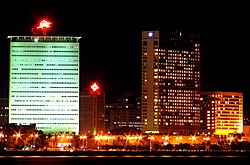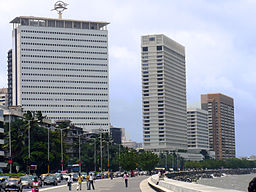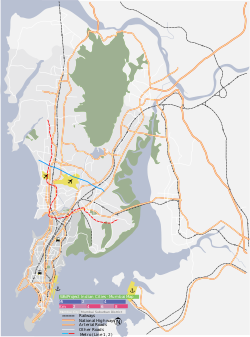Nariman Point
Nariman Point | |
|---|---|
Urban | |
 | |
| Coordinates: 18°55′34″N 72°49′23″E / 18.926°N 72.823°E | |
| Country | India |
| State | Maharashtra |
| District | Mumbai City |
| City | Mumbai |
| Founded by | Khurshed Nariman |
| Named for | Khurshed Nariman |
| Government | |
| • Type | Municipal Corporation |
| • Body | Brihanmumbai Municipal Corporation (BMC) |
| Languages | |
| • Official | Marathi |
| Time zone | UTC+5:30 (IST) |
| PIN | 400021[1] |
| Area code | 022 |
| Vehicle registration | MH 01 |
| Civic agency | BMC |
Nariman Point is a prominent downtown area of Mumbai in Maharashtra, India. Located on the southern tip of the Mumbai peninsula, at the end of the Mumbai's Marine Drive, Nariman Point houses some of India's prestigious business headquarters.
It is bordered by Churchgate in North, Arabian Sea on West and South, by Colaba on East side. It is one of the tourist attractions of Mumbai due to its skyline, Arabian sea view, Marine drive and lots of luxury 5 star hotels, restaurants.
History
[edit]Prior to 1940, the area was part of the Arabian sea. A popular leader of the Congress, Khurshed Nariman (affectionately called Veer Nariman), a Bombay Municipal Corporation corporator, proposed the land reclamation of the area of sea near Churchgate. To accomplish this task, the shallow seafront was filled with debris from various parts of the city. Reinforced concrete cement was also used, the steel for which had to be purchased on the black market at higher prices due to World War II.The entire cost was estimated to be ₹300,000 (equivalent to about ₹165 million in 2024). Additional reclamations were carried out in the 1970s. A construction boom in that decade also led to the development of commercial high-rises in the area.[citation needed]
In 2006, prior to the financial crisis of 2007–08, Nariman point was the seventh most expensive location in the world for office space.[2] However, by December 2012 Nariman Point had fallen to 25th place while Delhi's Connaught Place remained the fifth most expensive location despite many offices moving to Gurgaon and Noida.[2] During the same period, Nariman Point also dropped from seventh to fifteenth most expensive location for office rentals.[3] The reasons for the decline were the high prices, lower quality and age of construction, and increasing distances from residential hubs which have now moved northwards and to the suburbs.[3] In the first three quarters of 2012, Nariman Point had a vacancy rate of almost 25%, compared with 18% in the rest of the Mumbai city.[4]


Terrorist attacks
[edit]In 1993, the 1993 Bombay bombings took place. Bombs were destroyed at Nariman point and nearby places. There were also bombs in other parts of the city. [5]
On the evening of 26 November 2008, Pakistan trained Lashkar-e-Taiba Islamic terrorists attacked the luxury hotels Trident and Oberoi, located in this area. Both are luxury hotels. The terrorists attacked people with AK-47 assault rifles and Hand Grenades. This was part of the larger Mumbai terrorist attack. 166 people were killed, 238 injured to various degrees, and the Taj Hotel was besieged for 3 days. The Mumbai police apprehended one of the terrorists, Ajmal Kasab. The rest were eliminated in various operations by India's security forces.[6]
Economy
[edit]This section needs expansion. You can help by adding to it. (July 2016) |
Notable Headquarters and Offices
For many years, Air India operated from the Air India Building, one of the district's most recognizable landmarks, symbolizing the prominence of the national airline. Renewable energy companies, including Ind Renewable Energy Ltd and Vakharia Power Infrastructure Ltd, are headquartered in Regent Chambers, a prominent commercial building at 208 Nariman Point, housing various energy and infrastructure firms.[7]
International Presence
Several multinational companies have also chosen Nariman Point for their Indian operations. For example, All Nippon Airways, Japan's largest airline, once maintained its Mumbai sales office at the Oberoi Trident Towers, which is known for accommodating international businesses and embassies, adding to the area's global business footprint.
Business and Infrastructure Development
Over the years, Nariman Point has experienced infrastructure improvements and urban developments to support the high volume of corporate and commercial traffic. It remains a key business area despite rising commercial real estate costs and increasing competition from newer business districts like the Bandra-Kurla Complex (BKC). Its historical importance, prime location, and concentration of financial institutions, including banks, insurance companies, and consulting firms, contribute to Nariman Point’s standing as one of India’s premier business centers.
Gallery
[edit]-
A view of Nariman Point and Colaba in day light
-
View of Nariman Point in the evening
-
View of Colaba and Cuffe Parade from Nariman Point
References
[edit]- ^ "Pin code : Nariman Point, Mumbai". indiapincodes.net. Retrieved 9 February 2015.
- ^ a b Chadha, Sunainaa (21 December 2012), "The slow but steady death of Nariman Point", First Post.
- ^ a b "Nariman Point drops 7 places to 15th spot in global office rentals", The Times of India, 22 February 2012, archived from the original on 12 December 2013.
- ^ "Why Nariman Point is running on empty", Mumbai Mirror (Online Edition), 17 December 2012.
- ^ "1993: Bombay hit by devastating bombs". 12 March 1993.
- ^ "26/11 : The day terror hit us". 26 November 2021.
- ^ "Ind Renewable Enercy Ltd & Vakharia Power Infrastructure Ltd, Regent Chambers, Nariman Point, Mumbai". Bloomberg.











